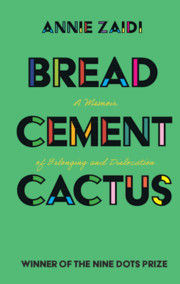Bread, Cement, Cactus
In this exploration of the meaning of home, Annie Zaidi reflects on the places in India from which she derives her sense of identity. She looks back on the now renamed city of her birth and the impossibility of belonging in the industrial township where she grew up. From her ancestral village, in a region notorious for its gangsters, to the mega-city where she now lives, Zaidi provides a nuanced perspective on forging a sense of belonging as a minority and a migrant in places where other communities consider you an outsider, and of the fragility of home left behind and changed beyond recognition. Zaidi is the 2019/2020 winner of the Nine Dots Prize, which seeks to reward creative thinking that tackles contemporary social issues. This book is also available as Open Access.
Annie Zaidi is a freelance journalist and scriptwriter based in Mumbai, India, and was named by Elle magazine as one of the emerging South Asian writers ‘whose writing … will enrich South Asian literature’. Her first novel, Prelude to a Riot, was published in 2019. Other books include Known Turf: Bantering with Bandits and Other True Tales, a collection of essays based on her experiences as a reporter, which was shortlisted for the Crossword Book Award in 2010, and Love Stories # 1 to 14, a collection of short fiction published in 2012. She also edited the anthology Unbound: 2,000 Years of Indian Women’s Writing, published in 2015.

